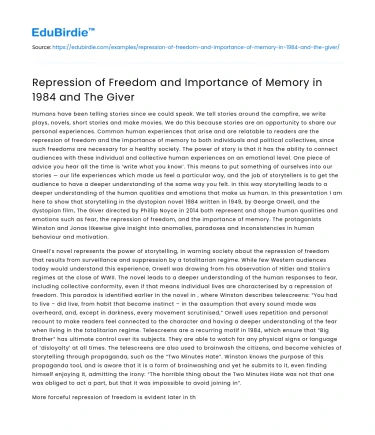Humans have been telling stories since we could speak. We tell stories around the campfire, we write plays, novels, short stories and make movies. We do this because stories are an opportunity to share our personal experiences. Common human experiences that arise and are relatable to readers are the repression of freedom and the importance of memory to both individuals and political collectives, since such freedoms are necessary for a healthy society. The power of story is that it has the ability to connect audiences with these individual and collective human experiences on an emotional level. One piece of advice you hear all the time is ‘write what you know’. This means to put something of ourselves into our stories — our life experiences which made us feel a particular way, and the job of storytellers is to get the audience to have a deeper understanding of the same way you felt. In this way storytelling leads to a deeper understanding of the human qualities and emotions that make us human. In this presentation I am here to show that storytelling in the dystopian novel 1984 written in 1949, by George Orwell, and the dystopian film, The Giver directed by Phillip Noyce in 2014 both represent and shape human qualities and emotions such as fear, the repression of freedom, and the importance of memory. The protagonists Winston and Jonas likewise give insight into anomalies, paradoxes and inconsistencies in human behaviour and motivation.
Orwell’s novel represents the power of storytelling, in warning society about the repression of freedom that results from surveillance and suppression by a totalitarian regime. While few Western audiences today would understand this experience, Orwell was drawing from his observation of Hitler and Stalin’s regimes at the close of WWII. The novel leads to a deeper understanding of the human responses to fear, including collective conformity, even if that means individual lives are characterised by a repression of freedom. This paradox is identified earlier in the novel in , where Winston describes telescreens: “You had to live – did live, from habit that became instinct – in the assumption that every sound made was overheard, and, except in darkness, every movement scrutinised,” Orwell uses repetition and personal recount to make readers feel connected to the character and having a deeper understanding of the fear when living in the totalitarian regime. Telescreens are a recurring motif in 1984, which ensure that “Big Brother” has ultimate control over its subjects. They are able to watch for any physical signs or language of ‘disloyalty’ at all times. The telescreens are also used to brainwash the citizens, and become vehicles of storytelling through propaganda, such as the “Two Minutes Hate”. Winston knows the purpose of this propaganda tool, and is aware that it is a form of brainwashing and yet he submits to it, even finding himself enjoying it, admitting the irony: “The horrible thing about the Two Minutes Hate was not that one was obliged to act a part, but that it was impossible to avoid joining in”.
More forceful repression of freedom is evident later in the novel when storytelling takes the form of reprogramming under torture, when Winston finds himself in the so-called “Ministry of Love” with O’Brien. Winston makes the declarative statement that: “Nothing in the world was so bad as physical pain” showing how his experiences override his political ideals. As a result of this torture, Winston loses his conviction and beliefs and finds himself doing anything to avoid further pain, such as confessing to all manner of absurd crimes, evident in the cumulative listing: “He confessed that he was a religious believer an admirer of capitalism and a sexual pervert”. In the end, Winston loses the metaphorical space of his individualism : “Nothing was your own except the few cubic centimetres in your skull” and determines that “He loved Big Brother”. Through Winston’s subjugation and newfound loyalty to the Party, Orwell shows the significance of individual freedoms and personal memories and warns about the power of subversive forms of storytelling to shape human qualities, emotions and beliefs.
Storytelling in 1984 also involves the absence of history, the collective stories of the past, and individual memories that reveal human qualities and emotions which are no longer condoned by the Party. Winston's rebellion against the Party, includes his attempt to find that redacted history: “Who controls the past controls the future: who controls the present controls the past.'. The Party’s slogan is widely disseminated and acts as a reoccurring motif to control society. When Winston tries to question an old man in a public bar – a dangerous thing to do and a sign of Winston's hunger to learn about the past— the old man remembers nothing except a few random words and details. Winston reflects on the difficulty of his attempt, as truth has become relative under the Party’s regime: “He reflected, the huge and simple question, 'Was life better before the Revolution than it is now?' would have ceased once and for all to be answerable. But in effect it was unanswerable even now, since the few scattered survivors from the ancient world were incapable of comparing one age with another”. The use of antitheses in this extract tells us much about the frailty and unreliability of human memory but also, its centrality to the human experience. Winston’s society is hopeless in part because they have lost the collective story of their past. His interest in recovering these memories makes Winston, as O'Brien points out the hyperbolic, 'last man,' since everyone else has forgotten the stories that made them human






 Stuck on your essay?
Stuck on your essay?

